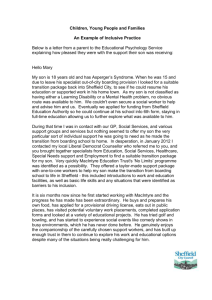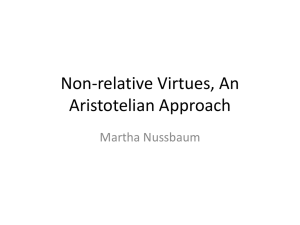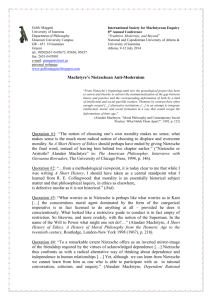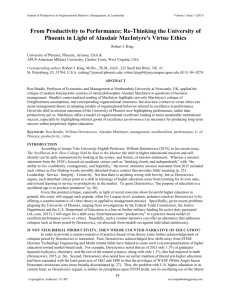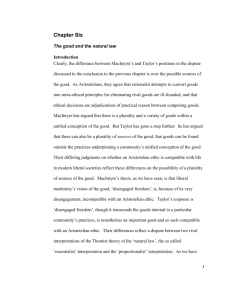Contemporary Communitarianism, part II
advertisement
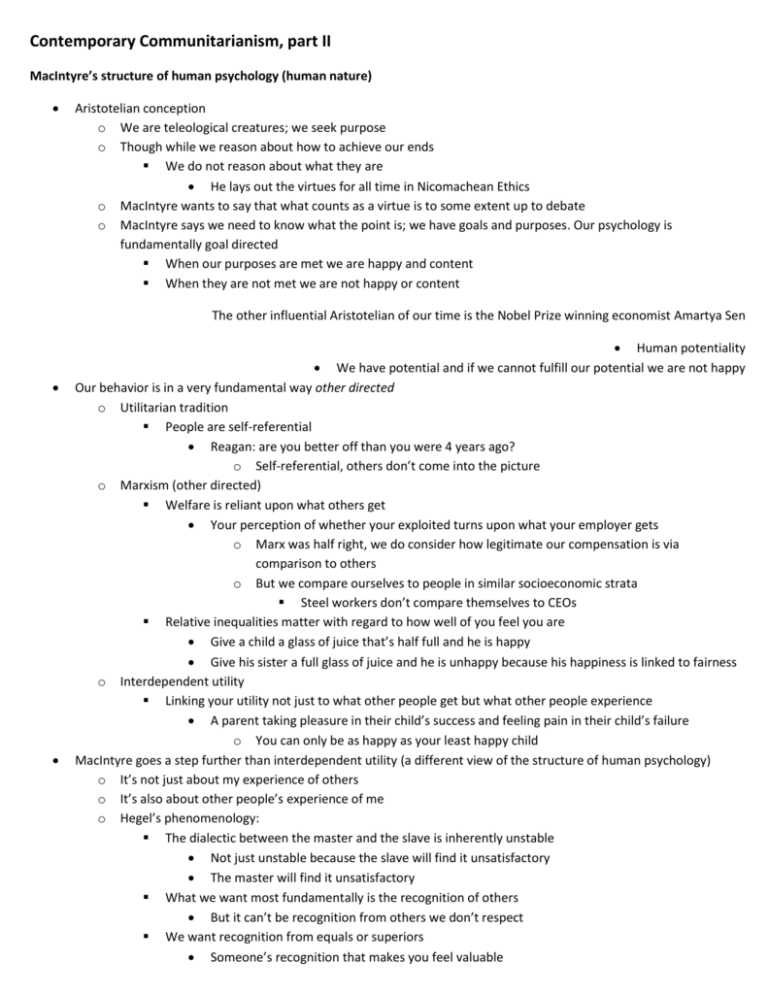
Contemporary Communitarianism, part II MacIntyre’s structure of human psychology (human nature) Aristotelian conception o We are teleological creatures; we seek purpose o Though while we reason about how to achieve our ends We do not reason about what they are He lays out the virtues for all time in Nicomachean Ethics o MacIntyre wants to say that what counts as a virtue is to some extent up to debate o MacIntyre says we need to know what the point is; we have goals and purposes. Our psychology is fundamentally goal directed When our purposes are met we are happy and content When they are not met we are not happy or content The other influential Aristotelian of our time is the Nobel Prize winning economist Amartya Sen Human potentiality We have potential and if we cannot fulfill our potential we are not happy Our behavior is in a very fundamental way other directed o Utilitarian tradition People are self-referential Reagan: are you better off than you were 4 years ago? o Self-referential, others don’t come into the picture o Marxism (other directed) Welfare is reliant upon what others get Your perception of whether your exploited turns upon what your employer gets o Marx was half right, we do consider how legitimate our compensation is via comparison to others o But we compare ourselves to people in similar socioeconomic strata Steel workers don’t compare themselves to CEOs Relative inequalities matter with regard to how well of you feel you are Give a child a glass of juice that’s half full and he is happy Give his sister a full glass of juice and he is unhappy because his happiness is linked to fairness o Interdependent utility Linking your utility not just to what other people get but what other people experience A parent taking pleasure in their child’s success and feeling pain in their child’s failure o You can only be as happy as your least happy child MacIntyre goes a step further than interdependent utility (a different view of the structure of human psychology) o It’s not just about my experience of others o It’s also about other people’s experience of me o Hegel’s phenomenology: The dialectic between the master and the slave is inherently unstable Not just unstable because the slave will find it unsatisfactory The master will find it unsatisfactory What we want most fundamentally is the recognition of others But it can’t be recognition from others we don’t respect We want recognition from equals or superiors Someone’s recognition that makes you feel valuable All political theories are predicated upon some account of the structure of human psychology and some account of how the world works causally o When evaluating them, ask: o What is the theory of human psychology driving this theory? Does it make sense? Is it true to my own experience? If not, why? o What are the assumptions about how the world works causally? Virtues embedded in practices “It belongs to the concept of a practice as I have outlined it – and as we are all familiar with it in our actual lives, whether we are painters or physicists or quarterbacks or indeed just lovers of good painting or first rate experiments or a well-thrown pass – that its goods can only be achieved by subordinating ourselves within the practice in our relationship to other practitioners. We have to learn to recognize what is due to whom; we have to be prepared to take whatever self-endangering risks are demanded along the way; and we have to listen carefully to what we are told about our own inadequacies and to reply with the same carefulness for the facts.” – After Virtue, p. 191. o When you walk into your new job and say “How should we run this place?” o Instead you find out the practices, the norms, what are the rules, what is expected of me? How do I know if I’m doing well? It may occur to you later that the business was not run well But first you have to internalize the practices and norms of the organization The Primacy of the Individual vs. the Group Rather than the voluntary agent being at the center of things (Workmanship story) the anti-Enlightenment story subordinates the individual to the practice, to the group, to the inherited system of norms and values o Features of Aristotelian (or Neoaristotelian) psychology 1. We are teleological; we are purposive a. We have potential to realize and realizing that potential is critical to our happiness i. There is a developmental element to this 2. The individual is subordinated into a practice a. This translate into the community coming before the individual in politics 3. Human nature is malleable a. It’s plastic and can be shaped in many different ways 4. MacIntyre insists that what is so deeply misguided about the Enlightenment project is that is does not take this into account a. Human psychology is shaped by circumstances i. When Rousseau says that he is going to reason about politics taking men as they are and laws as they might be underscores that he is missing the developmental nature of human psychology Aristotle’s Teleological Scheme “We thus have a threefold scheme in which human-nature-as-it-happens-to-be (human nature in its untutored state) is initially discrepant and discordant with the precepts of ethics and needs to be transformed by the instruction of practical reason and experience into human-nature-as-it-could-be-if-it-realized-its-telos. Each of the three elements of the scheme – the conception of untutored human nature, the conception of the precepts of rational ethics and the conception of human-nature-as-it-couldbe-if-it-realized-its-telos – requires reference to the other two if its status and function are to be intelligible.” – After Virtue, pp. 52-3. o o o o o Aristotle had a view of brute human nature; how they are as they are born And an account of how we could be Then he had an account of the rules and norms that get you from one to the other o Ethics o When one reads Rawls there is no theory of family life or education This would have been very bizarre to Plato and Aristotle Half of The Republic, a book about politics, is about rearing children and educational systems MacIntyre’s problem: o We want to derive the rules of ethics from human nature as it is, as we find it o But that will never work because the rules of ethics are designed to improve behavior o Anything that’s designed just from people as they happen to be will seem unsatisfactory to us Ethics is more than just accepting the differences among us The Hopelessness of the Enlightenment Project “Since the moral injunctions were originally at home in a scheme in which their purpose was to correct, improve and educate that human nature, they are clearly not going to be such as could be deduced from true statements about human nature or justified in some other way by appealing to its characteristics. The injunctions of morality, thus understood, are likely to be ones that human nature, thus understood, has strong tendencies to disobey. Hence the eighteenth-century moral philosophers engaged in what was an inevitably unsuccessful project; for they did attempt to find a rational basis for their moral beliefs in a particular understanding of human nature, while inheriting a set of moral injunctions on the one hand a conception of human nature on the other which had been expressly designed to be discrepant with each other…They inherited incoherent fragments of a once coherent scheme of thought and action and, since they did not recognize their own peculiar historical and cultural situation, they could not recognize the impossible and quixotic character of their self-appointed task.” – After Virtue, p. 55. o o o The morality that comes out of this reasoning will seem and indeed be unsatisfying to us o We shouldn’t be surprised for example, that objective utilitarianism let’s people to take advantage of others in morally appalling ways, and we shouldn’t be surprised that subjective utilitarianism let’s people ignore each other in morally appalling ways A kind of secular doctrine of the fall o The fall, then we have inadequate human beings o And the possibility of redemption through internalizing the doctrine of and accepting Christ as your savior The rules of ethics will help us become risen Life’s lived in accordance with the ethics allow us to realize our purposes in a good way o o The Enlightenment project has made us agnostic about people’s purposes and just try to set ourselves up as the most effective executor of any purpose o A: I’m a consultant o B: For what? o A: Anything you need Capitalism vs. Communism is how the Enlightenment project has played itself out in politics and MacIntyre is appalled by both MacIntyre’s Prescription “What matters at this stage is the construction of local forms of community within which civility and the intellectual and moral life can be sustained through the new dark ages which are already upon us. And if the tradition of the virtues was able to survive the horrors of the last dark ages, we are not entirely without grounds for hope. This time however the barbarians are not waiting beyond the frontiers; they have already been governing us for quite same time. And it is our lack of consciousness of this that constitutes part of our predicament. We are waiting not for a Godot, but for another – doubtless very different – St. Benedict.” – After Virtue, p. 263. o o o o MacIntyre is almost dystopian MacIntyre was criticized because this seems like throwing in the towel o He wrote Whose Justice, Which Rationality was written as a response MacIntyre never had more to say than this about the actual politics that should flow from his thinking o A diagnosis without a cure He would likely say that Islamic terrorism is the inevitable consequence of the relentless spread of Enlightenment ideas MacIntyre makes one concession to Enlightenment thinking though o o Aristotle said we don’t reason about ends only means o Aristotle sees ends as given MacIntyre disagrees So how do you allow ends to be put in question as subjects for debate and not wind up with emotivism? o o o A difference between human beings and dogs is that they can’t reason about their ends o A dog wants to sit on your lap, or wants to chase things; their ends are given Human are capable of thinking about purposes and goals MacIntyre wants to say: o We have the structure of an Aristotelian psyche but not the content o We are not dogs and can reasonably appraise our goals What do you do with the fact that humans reason about goals? o o o Thus he introduces the concept of a practice o We don’t pluck them from nowhere We know the rules of chess and use them o We are born into a world with the goals defined We don’t say let’s invent our own board game o It’s tradition We are born into practices and communities and we reproduce them into the future simply by living in them o We inherit, we live and we reproduce into the future Very similar to Burke’s line about o o o o Yes we are a part of a social contract but it’s a contract between those who are living, those who are dead and those who are yet to be born So yes we do question o Should it be the goal of chess to beat the other person with as many of their pieces on the board as possible or get checkmate with all their pieces on the board? You could have a debate But it’s a structured debate o Our debates about ends are always like that Look at debates in Catholic Church Next generation of Catholics don’t ask should there be a Pope? Your born into this existing structure o You may question Papal infallibility now Questioning is always from the point of view of someone born into the tradition It makes no sense to critique from the outside because it will mean nothing to the members Traditions are how we reproduce practices into the future o And there is questioning within these traditions but it will always be a bounded, structured debate o If you want to change people’s behavior You have to use values they embrace to influence them and convince them that these norms and values are harming them o Criticism from outside will never have an impact We can argue and reason about ends, but only from within the traditions
